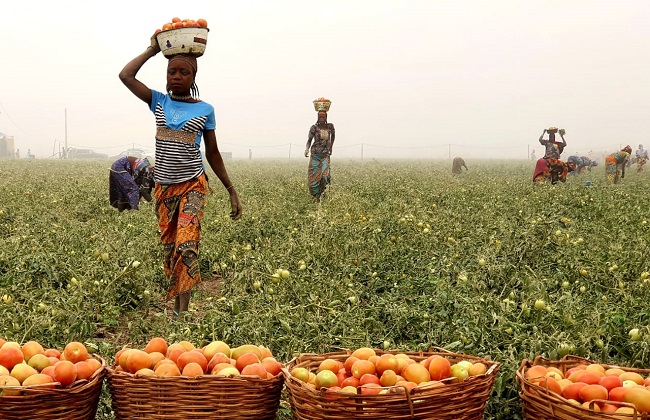Kuda Gangara Integrated Tomato Farm, a project by Caraway (an Olam group company) in Jigawa State, has recorded its first commercial harvest at 40 metric tonnes per hectare, exceeding earlier projections.
The 500-hectare tomato farm investment’s yield is also more than four times the average yield in Nigeria.
Out of the 500 hectares, 100 hectares have been cultivated, and yields from the first commercial harvest have exceeded the initial projection which was 30 MT per hectare.
When the complete 500 hectare expanse is cultivated, overall production would be over 15,000 MT from the commercial farm alone. The project also runs a farmer outgrower program that covers over 2000 farmers currently.
The is part of the backward integration initiative of Olam-Caraway, to strengthen local sourcing of raw materials for the company’s tomato paste factory in Lagos.
About 18,000MT of concentrate per annum is required by Caraway, but with the current backward integration efforts, the shortfall in sourcing inputs will be reduced.
Currently, Caraway has a capacity to produce 44,000 MT of different products under the brands of Derica, Tasty Tom, Jollof Mix, Onion Pepe and others.
About $20 million has been currently invested by the company in developing the commercial farming and outgrowers program, crushing, and the plants for processing and packaging.
Head of Farming Initiatives of Olam, Reji George, said the investment aims at complementing the drive to move agriculture into a self-reliant and sustainable model by the Nigerian government, and ensuring enough, quality food to the population, as well as environmental sustainability.
“Besides, we are a leading entity in the Tomato supply chain by having a major share of the market and being present in this product over many years,” Reji further says. “Using significant volumes of Tomatoes for our products, the backward integration helps us to achieve self-sufficiency, develop local farmers and provide increased employment opportunities to the local population.
“The current year’s crushing is expected to yield about 2000 MT of concentrates for further value addition and packing at the Caraway plant in Lagos. Caraway (an Olam Group Company) has partnered with a local crushing facility, Aldusar Foods & Beverages in Katsina State as part of the local value chain in this backward integration process.
“Caraway hopes to achieve the supply of homegrown and processed innovative tomato product brands of Derica, Tasty tom, jollof mix, onion Pepe etc for domestic consumption,” says George.
Furthermore, Premender Sethi, Business Head, Packaged Food Business, Caraway (Olam Group), says this achievement represents “A complete end to end Supply chain solution for domestic markets – right from growing to crushing to processing to packaging for the domestic markets (from naturally grown high quality fresh tomatoes).”
He said the impact of this investment will be seen in the company’s Forex outflow which according to him, will decrease and so will the pressure to manage it.
“Flexibility will increase as we can get the products produced locally and at high quality. The key critical areas to ensure are the consistency in the Fed Govt policies and an enhanced level of security,” he says.
Nigeria is faced with low farm productivity and high postharvest losses in tomato production.
This project has however shown possibilities that exceeding 200 per cent yield increase of tomato compared to the current yield per hectare.
Furthermore, the buyback mechanism of fresh tomato fruits through a network of outgrower farmers and supplying to the crushing plant within 24 hours has also reduced postharvest losses by more than half.
Director General Jigawa State Investment Promotion Agency, Furera Isma Jumare, said the significance of the caraway tomato project is that Jigawa would be showcased as one of the largest tomato-producing states in the country.
“The caraway project, especially with harvest already beginning within a short period of time, clearly shows the tomato potential of the state, and it will put us right on the map of those that are the largest producers,” Jumare says.
WATCH TOP VIDEOS FROM NIGERIAN TRIBUNE TV
- Let’s Talk About SELF-AWARENESS
- Is Your Confidence Mistaken for Pride? Let’s talk about it
- Is Etiquette About Perfection…Or Just Not Being Rude?
- Top Psychologist Reveal 3 Signs You’re Struggling With Imposter Syndrome
- Do You Pick Up Work-Related Calls at Midnight or Never? Let’s Talk About Boundaries






